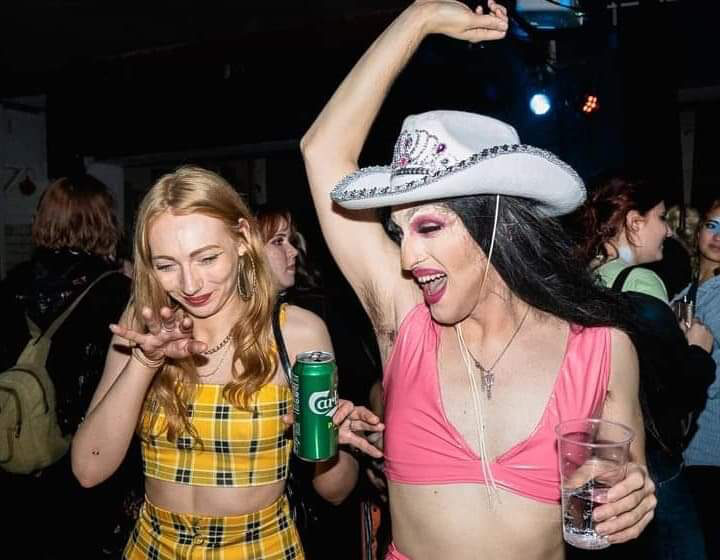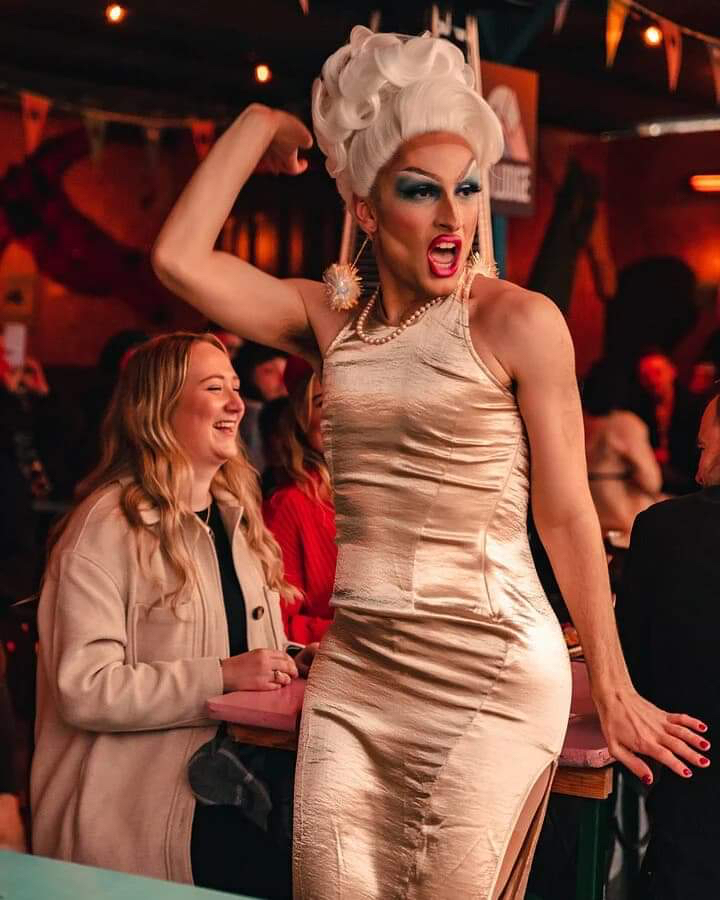
Koko Popperz on the Commercialisation of Drag
In the last few years, interest in the world of drag has skyrocketed. Today, more Queens than ever before are out there challenging gender binaries and deconstructing traditional views of femininity. Leeds-based Queen Koko Popperz is one of them.
From humble beginnings dressing up as a flapper girl for primary school Halloween parties, Koko has now firmly found her place in the Leeds drag scene, where she can regularly be spotted strutting her stuff at venues like Chow Down and Wharf Chambers:
“I’m still a baby queen – I’ve still only being doing it properly for a year but I’m quite happy with what I’ve done in a short space of time. I’m booked and I’m busy!’
The increased visibility of the world of drag has done huge amounts for the LGBTQ+ community. Although for Koko drag is primarily about having fun, she admits that, by definition, drag queening is also always inherently political:
“In and of itself drag is a political statement – in the same way that just being queer is a political statement as well.”
“Where I perform it’s all about creating queer spaces and keeping them fun, and drag queens are an agent to do that. Especially with the humour element as well – pushing it to the edge and being really rude and naughty. My route down drag has always been more comedic, and focused on the entertainment side of things, but with that intrinsically pro-queer edge to it too.’.
I wonder if Koko ever wishes she could separate her hobby from all the politics that surrounds it, but she tells me that this is all part of the appeal:
“It doesn’t bother me because I think that’s the element of it that I find really cool and interesting. It’s the fact that it’s all kind of playing on society’s view of femininity and deconstructing that and then blowing it up to the biggest exaggerated proportion ever, within a queer space.”
“I think the political side of all of it is the part that’s the most fun. I take that into my daily life of just being queer too. I think a lot of aspects of queer existence go against the grain, and drag is one of the really well-known ones that does that really well.”

We discuss how the rising popularity of drag can partly be attributed to the emergence of popular shows like Ru Paul’s Drag Race, which has brought an unprecedented level of attention to the scene:
“It can’t be overstated how influential Drag Race has been on the drag scene. Many queens now working in the city probably only started because of that programme – I’m one that can be included in that list.”
Koko explains that the increased attention Drag Race has afforded the scene has brought about many benefits, from a greater sense of acceptance to more opportunities and better pay for Queens. However, she adds that the commercialisation of drag can also be a double-edged sword:
“The flip side is that some people would argue drag has lost its edge or developed a more mainstream, palatable side to it. There’s also loads of people wanting to be drag queens now, so it’s a more competitive world than ever.”
Koko also points out that there is a strong class angle to the world of drag, which isn’t always discussed:
“It’s a really expensive hobby. If you’re performing, you’re now expected to be at a level of being extremely polished and ready for Drag Race runway. You’re meant to have these wigs that are twice the size of your head and massive sequined custom gowns, which is something that most people just can’t afford.”.
She points out that this can lead to the accusation that drag has lost its ‘radical edge’, in virtue of how ‘commercialised’ and ‘money based’ it has become:
“The queens that go on Drag Race literally spend thousands of pounds to be there. It makes it quite exclusive and inaccessible to people, especially if you’re from a lower-income background and don’t have that kind of disposable income to even get a foot in”.
However, on balance, Koko deems the increased exposure to be a good thing. The huge expansion of the scene in the last few years, she explains, means that not all of it has necessarily become more ‘commercial’:
“If you know where to look and you know the right events, there’s still all the down and dirty, slap dash, really punk drag out there. The scene has just got bigger so the mainstream culture is now kind of a mix of everything: whether that’s your end of the pier, foul mouth, Blackpool drag or your American pageant stuff.”
Such spaces exist on our doorstep here in the North too. Koko says there is a ‘massive divide’ between the ‘mainstream’ gay scene in Leeds and the more ‘alternative’ spaces:
“The alternative queer scene is completely different. Places like Wharf Chambers, for example, create specific safe space policies where it’s like ‘right, we’re not having any transphobia, and this is how it will be dealt with if we do’.”
“Then there’s places like Homoelectric in Manchester where they have a variety of performers – not just cis men – but women, non-binary people and trans people too. Everyone’s just dressed-up crazy and being dirty and naughty and dancing away. All of that side of the scene is just really driven by queer people and queer interests.”
For Koko, this is the scene that she really wants to stay a part of. For her, drag has always primarily been, and continues to be, about having fun:
“I’d rather be in that next wave of queens just doing our own thing, performing in queer spaces and seeing what comes of it. Ultimately, I’ll be here until I stop having fun, because, for me, that’s what it’s all about.”
Follow @kokopopperz on Instagram for more!!
Header Image Credit: Koko Popperz

